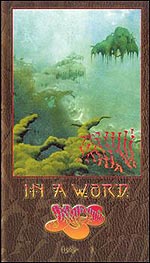
|
|||
|
|||
| Home |
| Gallery |
| Culture/ Technology |
| Fiction |
| Music |
| Poetry |
| Theater |
| What's New |
| About/Contact |
| Archive |
|
Box set shows magic of Yes continues From the Autumn 2002 issue.
The weird thing is, Yes never went away. We did. While many bands from the '70s were either packing it in or gradually turning into greatest-hits oldies acts, the members of Yes kept creating new music. The new stuff might not have been on the radio much anymore, but that had more to do with radio programming and audiences changing — not Yes. A new five-disc box set celebrating the music of Yes can't rightly be called a retrospective, given that the band has a new studio album coming out at the same time as the box set. It's not really a greatest-hits collection either, though, since it takes in much more than their hits. It's more of a collection of some really cool music they've done up until now. And what the six-some hours of music here shows is just how creative Yes has been over the past thirty years. The collection is arranged chronologically, which allows the listener to trace the band's history from its start as a rather faceless Brit prog-rock ensemble in the late '60s. In fact, the collection starts off with a cover of The Beatles' "Every Little Thing" from their first album. The band's somewhat halting efforts to find its way early on is reflected in the fact that their first four albums are represented on the first disc — while their two breakthrough efforts, "Fragile" and "Close to the Edge," together take up most of disc 2 and part of 3. It is discs 2 and 3 that are likely to hold the most interest for most fans of the band — here are most of their staple songs from the radio: "Roundabout," "Close the Edge" and "Long-Distance Runaround." The fourth disc takes in the rest of the '70s, and their final bit of commercial success in the early '80s when their album "90125" yielded the hits "Owner of a Lonely Heart," "It Can Happen," "Leave It" and "Hold On." If they've never returned to their one-time prominence on the airwaves or at the forefront of the music press, though, the last half of Disc 4 and the entirety of Disc 5 also show they never stopped making new music — much of it as interesting and listenable (or more so) than their earlier hits. "I Would Have Waited Forever" and "Lift Me Up" both came off the 1991 release "Union," and both are now part of their live shows for the simple reason that they stand up to the best material the band has ever written and performed. Six years later, the album "Open Your Eyes" contained gems like "Universal Garden" and the title track. For those of us who followed the band in their and our youth, but had drifted away in the '80s and '90s, hearing all this great music they did in our absence is a joyous revelation — as if we're rediscovering the band all over again. One example: "The Messenger" from 1999's "The Ladder" is as complex structurally as anything from their 1974 album, "Relayer" — which is commonly held to be their art-rock opus. And it's as melodic as any of their hits, showing that the members of Yes have continued to grow, to learn — to meld instrumental virtuosity with accessibility in ways they couldn't when younger. This isn't a band trying to recapture their old magic or hit-making ways, but rather an ensemble of musicians still looking for new sounds, new ways of playing. Being a product of Rhino Records, "In a Word" is gloriously packaged. Heavy-stock paper, full-color photographs, and biographical overload populate the nearly 100-page booklet accompanying the music. There is full discographical info on the band's history, each track is duly documented, and the personnel changes through the band's existence are wholly detailed. But any musical project is only as good as the music — and Yes has been a creative force for more than three decades now. More impressively, as the band's members head into their middle years they are more musically engaged than ever, writing and performing some of the best music of their lives. Whether the rest of us pay attention or not, it seems likely that thirty years hence we'll have a new Yes collection on our hands detailing their explorations from 2002 on. Review by Jim Trageser. Jim is a writer and editor living in Escondido, Calif., and was a contributor to the "Grove Press Guide to Blues on CD" (1993) and "The Routledge Encyclopedia of the Blues" (2005). |
Copyright © Turbula.net

